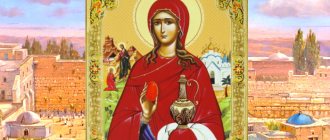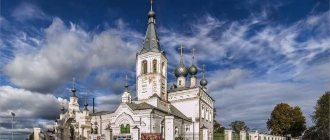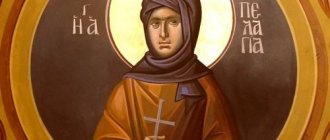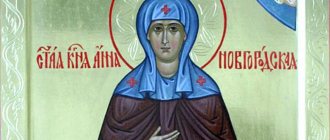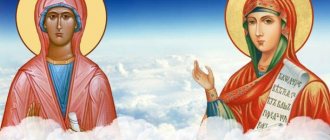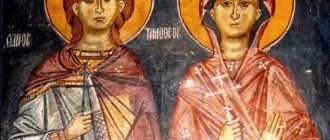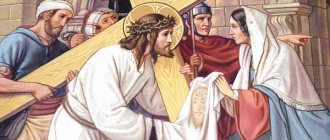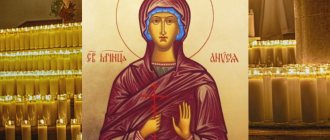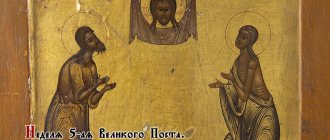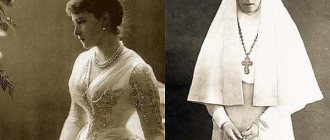Angel Mary Day - what date is this day celebrated? Maria is an incredibly beautiful name, the popularity of which has not decreased over many decades. Angel Mary's Day is celebrated many times a year, but each person chooses only one day for his name day, the one that is closest to his date of birth ahead on the calendar. Today we will talk about what date is Angel Mary’s Day according to the church calendar. Read the next article on, and you will also learn how to congratulate Mary on Angel Day.
Angel Mary Day
Usually, Mary's name day is celebrated on the day of the Blessed Virgin Mary. But according to the Orthodox calendar, Mary has an angel day in almost every month. Mary's name day coincides with the celebration of the Day of the Blessed Virgin Mary. There are quite a lot of these days.
In the Orthodox calendar, Mary has an angel day in almost every month
The most significant days of the angel Mary:
- January 31, October 11 - Mary of Radonezh;
- February 8, August 22 - Mary of Constantinople;
- February 19 - Martyr Mary;
- February 25 – Venerable Mary;
- April 6 and 14 are the name days of Mary of Egypt;
- April 25 – Maria Vifanska;
- May 17, August 4 - Mary Magdalene;
- August 28 - Most Holy Theotokos;
- August 22 – Maria Potrikia;
- August 24 – Maria Synclitia;
- September 21 - Nativity of the Blessed Virgin Mary;
- September 28 is the day of Mary of Yegis;
- November 11 – Maria Khidanskaya.
In addition to the main holidays, there are a huge number of name days in honor of the icons of the Mother of God and other great martyrs Mary.
Prayers
Wanting to receive a blessing from a pious family, they use the following texts for prayer.
Troparion
O God our Father,/ do always with us according to Your meekness,/ do not forsake Your mercy from us,/ but through their prayers// guide our lives in peace.
Translation: God of our fathers, who always deals with us according to Your meekness, do not remove Your mercy from us, but through their prayers, peacefully govern our lives.
Kontakion
Having escaped the sea of life, the righteous Xenophon / with his honest wife, their children are rejoicing in Heaven, / magnifying Christ.
Translation: Having escaped the sea of life, the righteous Xenophon and his venerable wife do not triumph in Heaven with their children, magnifying Christ.
In kontakion
You were vigilant in the commandments of the Lords, / lavishing your wealth on the poor, blessed one, / quietly with your spouse and your children; / you will also inherit // Divine pleasure.
Translation: You remained vigilant in the commandments of the Master (Matthew 26:41), having distributed your wealth to the poor, the blessed one lived peacefully with your wife and your children, therefore you inherited Divine pleasure.
Prayer
Oh, saints Xenophon and Mary with your children Arkady and John! Behold, we, unworthy and sinners, diligently resort to you and with strong hope we pray: mercifully hear our voice of prayer today and strive for our help, and now your love for us, servant to God (names), show the gracious effect of your God-pleasing prayers, send and We receive the great and rich mercy of the Lord, may we sing and glorify the wondrous God, the Father and the Son and the Holy Spirit in His saints, now and ever and unto the ages of ages.
Angel Mary Day according to the church calendar
Angel Mary Day is celebrated several times a year throughout the year according to the church calendar. On this day, you must definitely visit the temple and read a prayer in front of the face of the saint named Mary.
Dates for celebrating the day of the angel Mary according to the church calendar:
| date | Patron Saint |
| January 31 | Maria of Radonezh, schema-nun |
| February 8 | Mary of Constantinople, Palestine, Venerable |
| 2nd of March | Mariamne (Mary) |
| 20th of March | Maria Grosheva, nun, martyr |
| 14th of April | Mary of Egypt, Venerable |
| 25th of April | Maria Vifanskaya |
| May 17 | Mary Magdalene, Equal to the Apostles (myrrh-bearer) |
| June 5 | Maria Cleopas, Jacob, Josiah (myrrh-bearer) |
| June 11 | Maria Ustyuzhskaya |
| June 20 | Mary of Caesarea (Palestinian), martyr |
| July 2 | Mary, mother of Joseph |
| July 17th | Maria Romanova, Grand Duchess, Passion-Bearer |
| August 4 | Mary Magdalene, Equal to the Apostles (myrrh-bearer) |
| August 28 | Blessed Virgin Mary, Mother of God |
| 8 September | Maria Diveevskaya (Fedina), Fool for Christ's sake |
| September 21 | Blessed Virgin Mary, Mother of God |
| October 11 | Maria of Radonezh, schema-nun |
| 11th of November | Maria Khidanskaya, reverend |
| December 15 | Maria Zhuravleva, venerable martyr |
When and how to celebrate angel day
Orthodox tradition prescribes naming a child after the holy person whose memorial day falls on the child’s birthday. In this case, the angel's day and birthday are celebrated on the same day.
Angel Day is spent in prayer and reading the Bible
On name day, it is customary to visit church, where the owner of the name Maria must bow to the icon of her heavenly patroness and the Mother of God. On this day it is not customary to gather a noisy feast. It is spent in prayer and reading religious literature. Particular attention should be paid to the description of the life of the Heavenly Patron.
Saint Mary in Orthodoxy
In the Orthodox tradition, the doctrine of virginity is accepted.
Maria is a name of Hebrew origin (Mariam), translated as “beloved”, “desired”. In the Christian tradition, the meaning of the name is different - “lady”. This is due to the fact that this name was borne by the mother of Jesus Christ.
The Orthodox tradition has accepted the doctrine of virginity. According to this doctrine, the Virgin Mary “conceived a virgin, gave birth to a virgin, remained a virgin.” Hymns to the Mother of God are an integral part of worship in the Eastern Church and their positioning within the liturgical sequence indicates the position of the Mother of God after Christ. In the Orthodox tradition, the order of listing the saints begins with the Mother of God, followed by angels, prophets, apostles, church fathers, martyrs, etc.
The prerequisites for the exaltation of the Virgin Mary by all peoples (clans) are given in the Bible itself. John the Theologian in the Gospel of John testifies that Jesus performed the first miracle at the request of his mother, therefore the Mother of God is revered as an intercessor for the human race. There are a huge number of icons of the Mother of God. Many of them are considered miraculous.
There are various Christian views on the role of the Virgin Mary in Christianity, from complete veneration of Mary in the Roman Catholic Church to a minimized role of Mary in Protestant evangelical theology.
The Nativity of the Blessed Virgin Mary is a holiday dedicated to the birth of the Blessed Virgin Mary. The Nativity of the Virgin Mary is celebrated on September 21.
The Entry into the Temple of the Blessed Virgin Mary is a holiday dedicated to one of the events in the life of the Virgin Mary. The holiday is celebrated on December 4th.
The Orthodox holiday of the Dormition of the Virgin Mary is celebrated on the day of the death of the Virgin Mary. The Dormition of the Virgin Mary is celebrated on August 28.
The Protection of the Blessed Virgin Mary is celebrated on October 14. It is believed that the Mother of God saved Constantinople.
What does the name Maria mean?
A common female name has Hebrew roots. It is derived from the Hebrew name Miriam, which has many meanings, often contradictory to each other. Among the most common interpretations are the following:
- desired;
- rejected;
- bitter;
- madam;
- serene;
- sad.
This diversity affects the character of women named Maria. They are fair and principled people, while their reliability and hard work often border on stubbornness and willfulness.
Icon of the Holy Myrrh-Bearer Mary Magdalene
When communicating with people, Mashas show kindness, responsiveness and willingness to help. They do not get offended over trifles, but they take criticism towards them to heart. Women named Maria become good housewives, wives and mothers. They live for the sake of their family, organizing home life and taking care of their household members.
Mary of Egypt Angel Day
On April 14, Orthodox Christians celebrate the Day of Remembrance of the Venerable Mary of Egypt.
On April 14, the Orthodox celebrate the Day of Remembrance of the Venerable Mary of Egypt. In Christianity, Mary of Egypt serves as a symbol of repentance. The holiday is celebrated on the fifth week (Sunday) of Lent; Catholics celebrate it on April 3. On this holiday, a special service is performed in the church at Matins - the Standing of the Venerable Mary of Egypt.
For the willpower demonstrated during repentance, the Lord endowed Mary with knowledge of the Holy Scriptures, although she had never read the holy text. God also gave her the gift of insight and mind reading. In particular, she knew exactly the day of her death. In addition, as the monk Zosima testifies, during prayer the saint rose above the ground and hovered in the air almost half a meter from the surface.
In front of the icon of the Venerable Mary of Egypt, they pray for deliverance from bad passions and addictions: for example, they ask for help in getting rid of drug addiction, drunkenness, etc. They turn to her with repentance for an abortion. Women pray to Mary of Egypt, asking the saint to help with the right choice in life, to maintain chastity, to bestow modesty and Christian wisdom.
The holiday also has a popular name - Empty cabbage soup. Indeed, in the old days, by this time the supply of sauerkraut usually ran out, so cabbage soup was prepared liquid, adding perhaps sorrel or nettle. Also on April 14, Mash's name day is celebrated in honor of Mary of Egypt.
Mary Magdalene angel day
On August 4, the Orthodox Church honors the memory of Saint Mary Magdalene.
On August 4, the Orthodox Church honors the memory of Saint Mary Magdalene - an incredible woman who was crazy, but became a disciple of Jesus Christ, was the first to see Him risen and was the first person to say the phrase “Christ is risen!”
A woman was once born and raised in Magdala, whose name will forever go down in gospel history. The Gospel does not tell us anything about Mary’s youth, but Tradition tells us that Mary of Magdala was young, beautiful and led a sinful life. The Gospel says that the Lord cast out seven demons from Mary. From the moment of her healing, Maria began a new life. She became a faithful disciple of the Savior.
The Gospel tells that Mary Magdalene followed the Lord when He and the apostles passed through the cities and villages of Judea and Galilee preaching the Kingdom of God. Together with pious women - Joanna, the wife of Chuza (Herod's steward), Susanna and others, she served Him from their estates (Luke 8:1-3) and, undoubtedly, shared evangelistic works with the apostles, especially among women.
The Gospel tells that Mary Magdalene was also on Calvary at the time of the Lord’s crucifixion. When all the Savior’s disciples fled, she fearlessly remained at the Cross along with the Mother of God and the Apostle John.
Thanks to Mary Magdalene, the custom of giving each other Easter eggs on the day of Christ's Holy Resurrection spread among Christians all over the world. Already in old age, Mary Magdalene moved to Ephesus, where the holy Apostle John worked tirelessly, who wrote the 20th chapter of his Gospel from her words. There the saint ended her earthly life and was buried.
Her holy relics were transferred in the 9th century to the capital of the Byzantine Empire - Constantinople and placed in the church of the monastery in the name of St. Lazarus. During the era of the Crusades, they were transferred to Italy and placed in Rome under the altar of the Lateran Cathedral. Some of the relics of Mary Magdalene are located in France near Marseille, where a magnificent temple was erected in her honor at the foot of a steep mountain.
Life of Venerable Mary of Constantinople of Palestine
The husband of the Venerable Mary of Palestine, Xenophon, was one of the most notable dignitaries of Constantinople. The Lord gave him enormous wealth, but at the same time Saint Xenophon also possessed spiritual gifts - strong faith, pious behavior, and strictly observed all the commandments of the Most High.
The dignitary was not proud of his high position and wealth, realizing that this was temporary, but devoted more time to prayers and good deeds in order to have eternal life.
His wife, the noble patrician Maria, did not lag behind him in piety. Together they did many good deeds and regularly donated funds to the poor and Christian churches. The Lord blessed the family with the birth of two sons, Arkady and John, whom they taught not only book wisdom, but also instructed in the Word of God. They wanted to see in their children not heirs to a rich estate and noble citizens, but imitators of their godly life.
When their sons grew up a little, Xenophon and Maria sent the young men to study in the Phoenician city of Beritus, which at that time was famous for its schools. Some time passed after the children left, and suddenly the father of the family became very ill. His condition worsened every day, and Maria was preparing for the death of her husband. She sent a letter to her sons in Berit, telling them about their father’s illness, and asked the young men to return home as quickly as possible.
Saint Mary wanted her sons to find Xenophon alive and receive their father’s last blessing from him. When the sons arrived, the monk was so happy about their return that he immediately recovered.
He instructed his children and said that he asked the Lord to leave him on this earth until he saw the young men perfect in the faith. The next night, Xenophon had a vision in which the Lord commanded him to continue his life’s path on earth. After he told his dream to the family, Mary, together with the children, glorified the Almighty in fervent prayer and thanked him for healing the head of the family.
After Xenophon had fully recovered from his illness, he called his children and ordered them to return to Berith to complete their training in Hellenic wisdom. Having provided the children with everything they needed and asking for the Lord’s blessing on them, the father put them on the ship. At first the journey went well, but after a few days a strong wind arose and the ship began to sink. The shipowners left the ship in a small boat, and the passengers waited in horror for their inevitable death. Then the brothers prayed to the Almighty, asking for his protection and help in the name of their pious parents.
When the ship crashed, the brothers grabbed the first pieces of debris that came to hand and were carried ashore, but in different places, so they did not know about each other’s rescue.
John came to the gates of the monastery, where he spoke about the disaster that befell him and his brother and about his decision to become a monk and spend the rest of his life in fasting and prayer. The monks received the wanderer and instructed him in the rules of the monastery; after some time, John took monastic vows.
After the crash, Arkady came across a small village and, leaning against a pillar, began to shed tears over the death of his brother. In this position he fell asleep, and in a night vision he saw John, who spoke not to grieve about him, but to glorify the Lord for the salvation of body and soul. After this, Arkady went to Jerusalem to venerate the holy places, and when he left the city, he met an elder who told him that his brother was alive and had become a monk. Then Arkady followed the example of John and also took monastic vows.
The parents, who had not received news from their children for a long time, sent a slave to Berit to find out about their sons. Upon returning, the servant reported a terrible misfortune, but Xenophon, already at an advanced age, firmly believed that the Lord would save the children, and consoled Mary. After some time, the couple decided to make a pilgrimage to Jerusalem to the holy places. Imagine their surprise and joy when they met their children who labored in different monasteries. In gratitude for the miracle performed by the Almighty, both Maria and Xenophon accepted monasticism and spent the rest of their days in the monastery.
After meeting with their parents, John and Arkady went into the desert; after much prayer, the Lord blessed them with the gift of miracles and clairvoyance. Their parents also served the Lord until their death, distributing all their property to the poor and setting slaves free.
